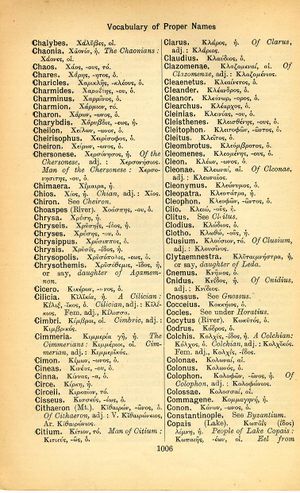Colophon: Difference between revisions
Κούφως φέρειν δεῖ τὰς παρεστώσας τύχας → Fiet levis fortuna, si leviter feras → Leicht muss man tragen das bestehende Geschick
m (Text replacement - "link={{" to "link={{") |
m (Text replacement - "}}]]" to "}}]]") |
||
| Line 1: | Line 1: | ||
{{WoodhouseENELnames | {{WoodhouseENELnames | ||
|Text=[[File:woodhouse_1006.jpg|thumb | |Text=[[File:woodhouse_1006.jpg|thumb | ||
|link={{filepath:woodhouse_1006.jpg | |link={{filepath:woodhouse_1006.jpg}}]]Κολοφῶν, -ῶνος, ἡ. | ||
<b class="b2">Of Colophon</b>, adj.: [[Κολοφώνιος]]. | <b class="b2">Of Colophon</b>, adj.: [[Κολοφώνιος]]. | ||
Revision as of 10:09, 15 August 2017
English > Greek (Woodhouse)
Κολοφῶν, -ῶνος, ἡ.
Of Colophon, adj.: Κολοφώνιος.
Latin > English (Lewis & Short)
Cŏlŏphon: ōnis (acc. -nem, Cic. Imp. Pomp. 12, 33;
I -na, Vell. 1, 4, 3; Tac. A. 2, 54), m., = Κολοφών, one of the twelve Ionian towns in Lydia, situated near the sea, and renowned for its cavalry, now perh. Zille or Altobosco, Mel. 1, 17, 2; Cic. Imp. Pomp. 12, 33; Liv. 37, 26, 5 sq.; Hor. Ep. 1, 11, 3. —
II Hence,
A Cŏlŏphōnĭus, a, um, adj., Colophonian: resina, Plin. 14, 20, 25, § 123 (also absol.: Colophonia, Scrib. Comp. 137 sq.): Idmon, Ov. M. 6, 8.—In plur.: Cŏlŏphōnii, ōrum, m., the Colophonians, Cic. Arch. 8, 19.—
B Cŏlŏphōnĭăcus, a, um, adj., the same: Homerus (since the inhabitants of Colophon considered him as their countryman; v. Cic. Arch. l. l.), Verg. Cir. 64; Cels. 5, 19, 11; 5, 19, 17.
Latin > French (Gaffiot 2016)
(2) Cŏlŏphōn,¹⁴ ōnis, f., Colophon [ville d’Ionie] : Cic. Pomp. 33 || -ōnĭăcus, a, um, Virg. Cir. 64 et -ōnĭus, a, um, Liv. 37, 26, 5, de Colophon || -ōnĭī, ōrum, m., habitants de Colophon : Cic. Arch. 19 || Colophōnĭa, æ, f., résine de Colophon : Scrib. Comp. 137.
Latin > German (Georges)
(1) Colophōn1, ōnis, Akk. ōnem u. ōna, f. (Κολοφῶν), eine der bedeutenderen ionischen Zwölfstädte an der Küste Lydiens, deren Einwohner später Lysimachus in Ephesus ansiedelte, mit dem dazu gehörigen (später ebenf. Kolophon gen.) Hafenort Notium u. dem berühmten Tempel u. Orakel des Apollo Clarius in der Nähe, Geburtsort des Mimnermus, ausgezeichnet durch Seemacht u. durch seine stets siegreiche Reiterei, berühmt durch das noch heute Kolophonium genannte Harz, j. Ruinen beim Flecken Chilli od. Zille, Hor. ep. 1, 11, 3. Liv. 37, 26, 5 sqq.: griech. Akk. -ona, Vell. 1, 4, 3. Tac. ann. 2, 54. – spät. Nbf. Colophōna, ae, f., Dict. Cret. 1, 17. p. 13, 28 M. Ven. Fort. vit. s. Mart. 2, 83. – Dav.: A) Colophōniacus, a, um, kolophonisch, Homerus, Ps. Verg. cir. 64: resina (s. no. B), Cels. 5, 19, 11 u. 17. – B) Colophōnius, a, um (Κολοφώνιος), kolophonisch, aus Kolophon, oppidum, Liv.: resina C., Cels. u. Plin., u. subst. bl. colophōnia, ae, f., Scrib., Kolophonium, Geigenharz od. -wachs (Κολοφωνία sc. ῥητίνη): Plur. subst., Colophōniī, ōrum, m. (Κολοφώνιοι), die Einw. von Kolophon, die Kolophonier, Col. u. Liv.

